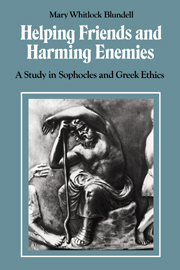6 - Philoctetes
Published online by Cambridge University Press: 14 January 2010
Summary
There are times … when reality bears features of such an impellingly moral complexion that it is impossible to follow the hewn path of expediency. There are times when life's ends are so raveled that reason and sense cry out that we stop and gather them together again before we can proceed.
Richard Wright, Native SonOdysseus and Neoptolemus
Philoctetes is the most ethically complex of all Sophocles' plays. Philoctetes, Odysseus and the background figure of Achilles present various paradigms for the young Neoptolemus, who must decide in the course of the play which, if any, to adopt as his model. Philoctetes and Odysseus are both endowed with established convictions, but Neoptolemus' moral character is still in the process of formation. Moral argument and choice take on a peculiarly dynamic role in the plot as we see him exposed to the influence of each of the two older men in turn.
Odysseus has come to Lemnos to steal Philoctetes' invincible bow, which, according to the oracle of Helenus, is necessary for Greek success at Troy. But he knows that Philoctetes hates him bitterly (75f.), so his plan requires the cooperation of Neoptolemus. Odysseus characterises the scheme as a joint one (25), but also makes his own controlling role quite clear. Neoptolemus is to serve (15), and to listen while Odysseus explains his plan (24f.). The young man's task is to exploit deceitfully the trust and friendship that may be expected to develop between him and Philoctetes when the latter discovers that he is Achilles' son (cf. 57, 7of., 242).
- Type
- Chapter
- Information
- Helping Friends and Harming EnemiesA Study in Sophocles and Greek Ethics, pp. 184 - 225Publisher: Cambridge University PressPrint publication year: 1989



